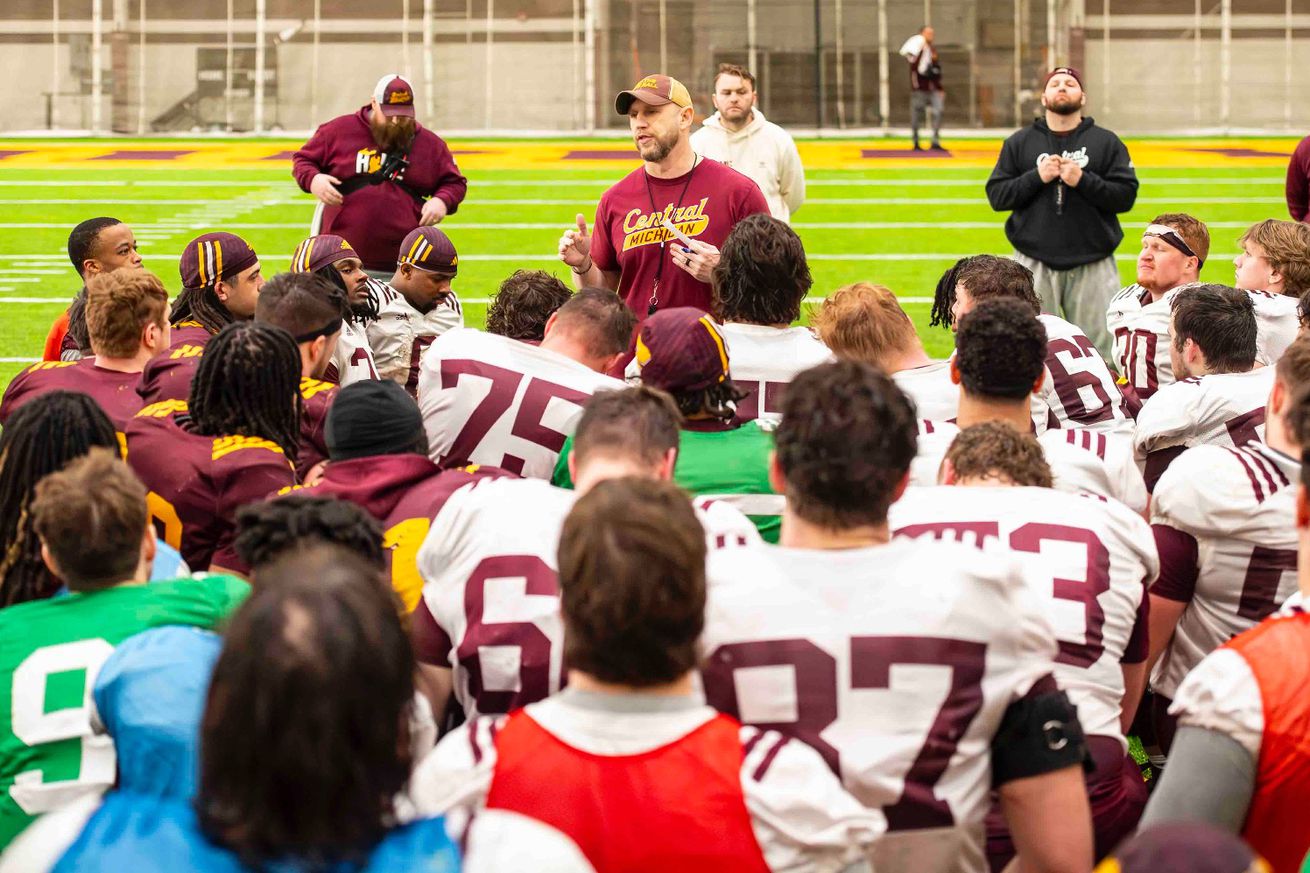
Bettendorf, Iowa’s own Matt Drinkall reached the apex of a decades-long journey to become a head coach earlier this year. We get to know him— largely unfiltered— with 13 questions.
When Jim McElwain retired after the 2024 season concluded, it left the community uncertain as to who would take his place. What was clear, however, was a coach with Midwestern roots and a winning pedigree would be important to the fanbase after three-straight seasons of losing football— a first for a traditionally strong program.
CMU targeted (and summarily hired) Army offensive line coach Matt Drinkall to the position, a move most fans did not see coming— much like the McElwain hire before him.
Drinkall, a native Iowan, previously made his hay as a head coach at the NAIA level with Kansas Wesleyan in the mid-2010s before being recruited by Jeff Monken to be an assistant on his staff at Army West Point, where he would stay for five years as the Black Knights ascended to Top 25 status.
Hustle Belt had an opportunity to catch up with Drinkall in early April before the program’s spring game, sitting down for an hour-long phone interview to learn about his personal life, his on-field philosophies and more.
Below, we have transcribed the entire interview, with light edits for clarification:
Hustle Belt: I know we just talked about it a little bit [off-record], but how have you settled into the new job in Mount Pleasant?
Matt Drinkall: I absolutely love it here. My wife came out to spring practice #6 yesterday and we were talking, walking back through the tunnel from the indoor to the football facility just how happy we are here. Just… what a great fit. And we knew that coming in, you know, like I said [earlier]… Mount Pleasant, Central Michigan, very blue collar, unbelievable people. Incredibly helpful and we love Michigan and the area too.
I just love our kids, our players, our staff. We talk about it every day, but we just love our players. They’re tough. They’re resilient kids. They’re doing a great job. They do everything that you ask, and the community is very, very similar to where I grew up in Iowa. So everything about it has been, I’ll be honest with you, a little too good to be true so far.
You were just saying that this job is very similar, you know, to kind of what growing up in Iowa was. What else about this specific job made it more desirable than maybe some other opportunities you might have had?
Yes, I’ve been very calculated and strategic in my career with where I move, so I’m not like one of those normal coaches that bump around all over the place. I’ve had three jobs in 17 years. I think the shortest I’ve ever stayed anywhere in the last 15 years is five years. I really enjoy the building process. I like building programs, or if there’s big changes that need to get made or build, you know, with building relationships with the kids, like that’s really what appeals to me and it’s I think part of it is it’s kind of in my wheelhouse as far as the skill set. That’s what I really enjoy doing. So it’s not my priority. It’s not necessarily like, how do I maneuver my career to make the most money or “will win the most games?” or coach at this level or in the this that very little value to me. So when I was looking at Central Michigan, it checked every box for my wife and I that we would want to live, and then not only that, but can have sustained long-term high levels of sustained success with.
Central Michigan has done that, [former CMU] Coach [Jim] McElwain has done that. So we really liked looking at it holistically. It’s a place with a really, really strong tradition. The history here, I mean [CMU] won a national title in [1974.] They have so many players that they’ve sent into the NFL that are currently in the NFL, a former number one pick [Eric Fisher, 2012]… [Former CMU quarterback] Dan LeFevour is one of the most prolific players in college football history…. So, a really strong tradition. Kelly/Short Stadium’s an awesome field and awesome stadium. The football facilities are incredible on the South end of the stadium and then the recruiting territory is great… Michigan and the Midwest and our region, with Chicago in our back pocket, is just our brand of football of how we’re going to do things and how we’re going to play.
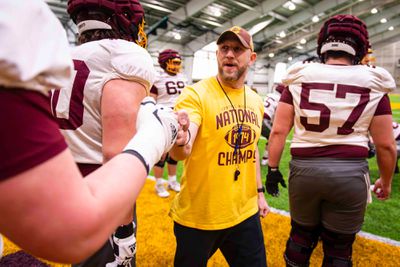
Central Michigan Athletics
Kim and I really, really liked our time at West Point, but we really love the Midwest.
I mean, I said I was born and raised in Iowa. Her dad was an executive for John Deere. She’s bounced around, but most of it, like in the Quad Cities and in the Kansas City area. We love the Midwest. You look at the healthy roster, I think Coach McElwain and his staff had done such a good job recruiting and sustaining success… he obviously has had so many different stops in his career where he knows what really good football looks like. So the the roster was really advantageous.
Once you just started aligning all those things and then and some of the other things too, like the leadership here was a big one for me. This is my second go-around as a head coach. The first time you do this as a head coach, you kind of have a plan for everything. You have a plan. At least I tried to, you know, as far as like the the scheme you’re going to run, or the coaches you’re gonna hire and how you’re going to run your day-to-day operations. But the one thing I didn’t think about was how critical the leadership is because that impacts how you do everything from a micro or macro level, so that one of the the maybe the biggest selling point here to me at Central Michigan was the leadership.
Amy Folan is our athletic director. She is one of 12 female athletic directors in the entire country. So you wanna talk about a tough, smart, competitive person? I mean, like, think of the lessons she can teach me in the stories and the experiences that she can share with me about how far her her fight and battle has been to get to do the things she’s done in her career to be in that role in Texas for a long time to be here at Central Michigan in executive level leadership roles. And then we just hired a new president who got here 30 days before me, President [Neil] McKinnon, who’s one of the most charismatic, energetic. People you’re ever gonna meet. I mean, it is impossible to meet President McKinnon and not be excited after five seconds of talking to that guy. So to me, all of those things, not only were in alignment with what Kim and I were looking for, but an opportunity to do that and run with it was, I mean, it’s exactly what you’re looking for as far as the scenario where at this step in my career in my life, this was, I mean literally almost like a perfect fit.
Right, let’s get down to the on-field stuff a little bit here. Where do you think the team’s strengths currently are right now and where do you think they should or can improve going into the season? Is there anybody we should be looking out for in particular?
[S]trength-wise, I think depth. We were able to sign 13 guys at mid-year and then our 15 high school kids that we had signed all enrolled early and start it up. So we’re going through spring practice with 101 players, and it’s very competitive at every position group. You know, there’s not a single kid on the roster we’re looking at and we’re like, “oh, boy, this guy doesn’t belong here.” Everybody’s doing an incredible job and everyone’s doing it… And when I say a great job, that’s not only in football, they’re all going to class. They’re all crushing the workouts. They’re doing outstanding in everything.
An area of improvement for us right now is just getting everybody, I mean healthy and aligned, you know. I mean, there’s a specific standard and way that we do things. That are really, really high-level and we’ve got some guys that had some pre-existing injuries or pre-existing academic issues, which to me is kind of the same, the same thing as something that could prevent you from not playing. Getting all those issues, you know, kind of ironed out and addressed and smoothed out in a way that those kids, When it’s fixed, now it’s not like their heads above water, but they’re swimming with or running with the rest of the herd.
What kind of systems do you will you be running at Central? I know you’re coming from Army, which had that option based attack. Then you’ve mentioned before [at your introductory press conference] that you know this offense won’t quite be based on that. And then defensively, we haven’t quite heard what you’re looking at doing there, but what are kind of the systems and philosophies you’ll be hoping to run on field?
Jim Chapin [recently hired from Eastern Washington] is our offensive coordinator. He is as sharp as a guy could be. We will look almost identical to the Baltimore Ravens on offense, or if you’ve seen, like, a Kansas State game. [Editor’s note: Chris Klieman, K-State’s head coach, runs a power spread system he inherited when head coach at FCS power North Dakota State.]
Probably 90 percent [of the offensive snaps] in shotgun or pistol. It will be based on [a] no-huddle communication system, but you will see us huddle some as a variance in tempo. It will be a power spread-based system. So quarterback run, read game, lot of read plays—But very physical, married with physical inside run game. So like I said, very similar to the Baltimore Ravens, we’ll be able to stretch and throw the ball all over, down the field and move the launch point quite a bit. So you want to be, you want to have the ability to be balanced in every full game, but we really want to start as our foundation with having a physical presence in between the C-gaps.
Defensively, Sean Cronin is our defensive coordinator who came with me from Army West Point. We will be multiple on defense, but he will base out of an even front. You’ll see us change out personnel packages quite a bit to get into some 3-4 looks, some dime personnel packages. But we we’re, again, our foundation will be based on fundamental football and stopping the run first.
So what is that message like in those [spring] practices? What is the message that you and your staff are kind of sending to those players as you’re starting to ramp up into like the rest of the season?
Whereas everybody else does spring ball kind of like one big installation, we’re doing all of it as two.
I would say once you fought through all the paperwork and stuff, [you have] probably a month to get mostly operational where you felt like everything was really running like a day to-day should be. So from that point to the till the end of May, we’re doing two different installations. the first one is a habit and behavioral install, like a culture install for lack of a better term. The second one is going to be much more of the actual football nuts-and-bolts and nuances. So right now is “guys, when we say this is how we flex” and “this is how we stretch” and “this is how we watch film, this is how we practice,” and “this is how we do individual work”, “this is what is acceptable leverage for us, this is what is acceptable physicality for us.” They’re learning all of that and much more.
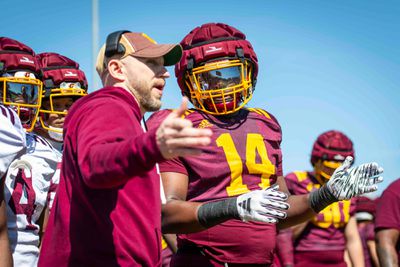
Central Michigan Atheltics
We’re much more centered on teaching those mechanics than we are “hey, this is where you’re going to put your hand on power and this is where the double team goes.” We’ll kind of get to that. So we’re starting slow, we don’t want it to be a hard-line transition. We’re starting to kind of shift gears into that messaging to where we’ve built in so many banked reps of behaviors and habits in a positive way of what we wanted. Now we can start to kick up the install with different mental stimuli and load put on there to really get the thing going.
All right, now we’re going to get into some of the more unique questions as it relates to you specifically.
You mentioned earlier that Jim McElwain, the former Central Michigan head coach, has been helping you. It’s a fairly unique situation; you don’t often get the opportunity to work with the former coach of the team as the new coach of a team in most scenarios for understandable reasons. How has working with McElwain been for you? How have you navigated it? How has he kind of helped you understand this team and Mount Pleasant and Central as a culture?
Perfect. I mean, he has been perfect to me since I have been hired. Like I mean as a professional, as a mentor and as a friend.
I say that in the sense like, it took me a little bit to get over the fanboy piece of it. Because you gotta remember, when I was coming up through coaching, I was watching on offense everything this guy was doing. I really started following him at Colorado State and was really impressed with everything he was doing offensively and how it followed his whole career, and so it was pretty surreal that I get hired and I sit down and one of the first things he does is he’s gracious enough to sit down with me and I think it was an hour and 15 minutes, he just spent straight [and] gave me the nuts and bolts of everything I needed to know to be successful.
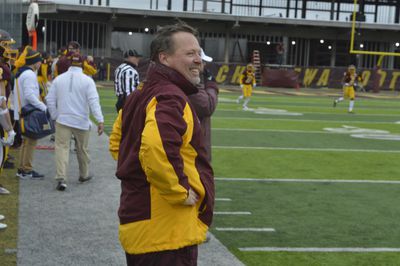
James H. Jimenez
I was sitting there taking notes, making mental notes, writing stuff down, I’ve called him several times; he’s been so great where he doesn’t want to be intrusive or step on my toes or anything like that, but I want him as a resource as much as I possibly can.
I put in calls to him for not only like schematic things, but running the program as a head coach to connect your contacts in town to “hey, how would you solve this problem?” or “what do I need to know when these recruiting areas?” or “hey, when you recruit against the rest of the MAC, what are issues I’m gonna run into or things I’m not thinking about?”
[McElwain] has been so good and so has Herb Deromedi. Coach Deromedi is a legendary Hall of Fame coach and was the [defensive coordinator] here on the ‘74 team I believe, and then won a couple MAC titles and was the MAC coach of the year three different times… he’s still in town and he stopped by practice and he’s gracious enough to stop by and give me some of his time every now and then. I mean, the stuff that he did back when the day when he was the coach here, you would be shocked at how much of it not only is spot on today, but even if it went away, would cycle back and it’s really the way to do things now. Those guys have been unbelievable.
Your coaching career has been very interesting. You get a lot of coaching cycle hires that are coordinators of power programs or maybe a position coach at [the Group of Five] level. It’s not terribly often you find a [G5] position coach like you were over at Army… and then your primary background as somebody who worked in a lot of NAIA ball, a lot of Division III, you know, stuff like that. You don’t exactly get head coaches at this level whose majority of their work’s from Kansas Weslyan.
What was the philosophy behind taking that route as a head coach? What do you think you were able to learn and put forward? In terms of your development as a coach going that route?
A couple things was… one, I got into coaching with no experience whatsoever. I didn’t really know. I was gonna do it until the very end, and I didn’t know what route I was gonna go. So when I was playing in college [at Iowa], I got hurt and had seven surgeries on my left leg and I spent— out of my last three years at college —spent almost two of the years on crutches.
My plan was to just get done with college and join the military. My brother’s retired Navy and he’s way older than me, and that was the route I was going to go because I didn’t know what I was going to do. When I was in Iowa I figured out, hey, maybe I should try this coaching thing out.
[When you’re] coaching Division I when you’re really young, you get to watch behind the scenes how those places function, but you don’t get to do very much meaningful work. Meaning— and maybe it’s changed some for young people— but back in the day you’re just licking a lot of envelopes and going to airports and stuff like that, picking up and driving cars and getting coffees. So I saw that’s how the business functioned. And then you kind of do a lot of hoping and praying. You hope that the guys you’re getting coffee for and making copies for… you hope that you’re around the right guys and that their careers go well and that you hope that they like you and that they bring you with.
That sucked to me. None of that looked fun or cool or interesting because I was starting to see guys that were in their mid-30s and they’ve [been a graduate assistant] at a bunch of Division I places, but they’ve never coached. Then they get in their 30s and people wonder “well, how come you’ve never been hired as a coach anywhere?” I didn’t like the idea of my future and career being tied to somebody else. So I wanted to go down, I wanted to move up in title as fast as I could, just for the experience in learning. The only way I could move up in title is to move down in level.
The other thing was I played receiver in college and I really wanted to be an [offensive line] coach. I wanted to coach in the box and do that because it fits my personality. I watched how Coach [Kirk] Ferentz and Coach [Joe] Philbin did it at Iowa. I watched how when you have guys that are really dominant at those positions, it’s 40 percent of the offense. You can be pretty average at a lot of the other positions if your line is really good. Or you could be really elite at all those positions and if you’re O-line’s bad, that’s probably bad news. Long story short, I went down a level so I could go up in title so I could become an O-line guy, become a coordinator, become a head coach and— if you’re a young coach listening to this— the best advice I could give you is coach a small college at some point in your career, because every job that you could do in college football, I have done it.
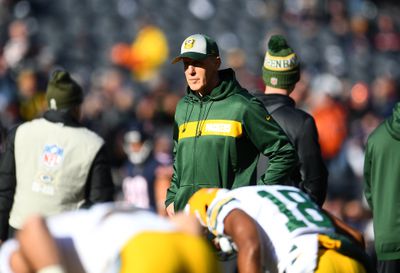
Photo by Stacy Revere/Getty Images
I have been the laundry guy. I have been the strength and conditioning coach. I have been the marketing guy, I’ve been the graphics guy. I’ve run the special teams, I’ve run the recruiting department, I’ve painted fields out of practice to get set up and lined them off. When you do those things, one, is it’s incredibly humbling, because you find out who really loves football. Some people like walking around with a cool logo on their shirt and telling people where they work. And there’s other people that really love football and love the relationships you build and how you do that and the responsibility you have to recruit and develop young people and making a difference in their lives. And that was what drove me.
You know, I’m very fortunate. I grew up in a small house with humble beginnings. My dad, a blue-collar factory worker at Caterpillar and then finished at Sears Manufacturing… like, I don’t need fancy stuff to be happy. I never have and probably never will, and I really like the process of the whole thing. That’s what I told, you know, during interview processes like, “listen, if you’re looking for some other recycled guy who’s going to get this job and start immediately looking for the next one and how could I move up? Don’t hire me. I’m not the guy you’re looking for.”
I want to go somewhere and do it my way, the right way, and surround myself and surround our players with great people. That was it, and it’s not for everybody. A lot of people have been in all different ways and been incredibly successful, but it’s just that’s how I prioritize my career based on my experience getting into it and then kind of what makes me happy.
Just to briefly follow up on that, you said that before going into football coaching, you were considering joining the military, so this is a very late development for you in terms of your like career path. What was like the moment that clinched it, the moment where you said, “you know what, I’m going to be a football coach”?
Oh dude, towards the end of the 2002 season at Iowa, I’d been going in there and watching film with these guys and the staff was, you know, the staff and the players in Iowa. It was, like, magical. It was like football heaven. It was the best collection of staff and players you could ever imagine in Iowa history, all together. You talk about making impact on a young person, with what that did for me.
But you know, just sitting there and I’d be going in the whole season or playing or helping out because you’re hurt and having surgery or whatever and I just remember sitting back for like watching film and I was like, watching all these people run through the hallway. I’m like, god dang, like, all these people have jobs within Iowa football, some of it’s in the weight room. Some of it’s watching film, some of it’s in recruiting, some of it’s coaching.
I was like “certainly, I could do this and find something!” I mean that was really it. I was just like, alright, well, I’ll try this out and then I just started going and I didn’t really think about… I don’t know if I should admit this, but like, I’ve never really thought about positioning and moving my career as much as I thought about “oh, I can do this job right now and if this is the job I’m doing, I’m gonna try to do it the best I possibly can.” And then you try to treat people right and kind of take it a day at a time is really what I did, especially starting out. So yeah, late development, but that was what led to it for sure.
You and your staff— this is the one thing I’ve really noticed from the time you’ve been hired— I’ve been covering Central football, going back to a student, so this will probably be my 11th year on the beat now. The one thing I’ve noticed about you and your staff in particular right away is you are extremely active on social media since coming in and accepting the job at Central. You know, it feels like hardly an hour goes by without something coming out for the program. What is the thinking behind that?
So I started doing that when I was the head coach at Kansas Wesleyan, because when you’re the head coach at Kansas Wesleyan, at a small place, it’s hard. There isn’t a big massive following. … If it’s not one of the blue blood main brands, you know, places with these cult followings of huge masses of alumni and fans, people connect more with individuals than they do with institutions.
I would argue that over the last 20 years, Colorado was out of that blue blood conversation, especially from a notoriety standpoint. But what Coach [Deion] Sanders has done there from a marketing standpoint? I don’t know if you can find somebody who’s smarter than that guy. I mean, he made the amount of revenue he’s generated for that institution and exposure for his players and opportunity for his players to promote themselves, their brand. NIL, bring attention to the program, watch all the different alumni and people that normally weren’t consuming Colorado football are now talking about it.
There’s some people that kind of dislike what Coach Sanders is doing and how he’s doing it. You know what they’re doing? They’re talking about Colorado football and paying attention to it. And I think the way that he’s doing it is at the forefront of the thinking of college football, so. There is some kind of happy medium between what, how Coach Sanders is doing it at Colorado and some of the cues and leads you could take from him with what I had been doing already from like a personal branding standpoint.
When I say personal branding, I just mean giving people exposure and access to you, as opposed to making it an ad for the school you work at or the program that you represent so much. When we’re at Central Michigan, I think that’s a big deal for us, as we have a really cool story to tell. You know, the reason I took the job is all the positives I talked about earlier, because we can talk about that.
Our staff can tell our story about all of our awesome players and all the cool things they’re doing. People that we work with, the traditions here, the stuff our players are doing, and we can tell that story to high school recruits, high school coaches. We can tell that story to alumni. We can tell that story to donors and fans, we can tell that story to teachers and our student body. We can tell that story to our players, parents and their families, to media people, to people in our conference. So to me, having a coordinated strategic effort to get your message out there when our players are doing great things in the community and in the classroom and on the field and in the weight room… I want our staff to show people that and talk about it.
HOME pic.twitter.com/b1rLiqrPxg
— Matthew Drinkall (@DrinkallCoach) April 16, 2025
What’s the big deterrent, right? It’s the transfer portal. Dude, if I have a player on my team that is so good and so valuable that Ohio State or Notre Dame is going to try to buy him away? What an awesome problem for everyone to have. You know what I mean? Like we, our players playing as a program that our program as a player is so valuable in all those capacities.
We’ve obviously been doing a good job and having success. And then what a great opportunity that is for our player to be able to make have those choices and decisions. You know that’s going to be the same thing. We want them to graduate and go into a world where three or five ultra-competitive companies, successful companies, are competing for our players’ services because they’re so valuable. I want to start that process for our kids as fast as I can. Social media, it’s a big deal for us. It’s a way for us to tell our story to a wide variety of people that consume our products.
I know you grew up in Bettendorf, Iowa. It’s not exactly a hoppin’ Metropolis or nothing like that, but do you remember like, one of the first autographs you got as a kid? Or maybe like a sighting of a celebrity? And if you do, like, is there anything special that you remember about that moment?
Yeah, actually. No one in my family played sports and I’m the youngest of 11. I’m like, oh, basically 11 years behind the next closest of my siblings, which I have three older. I was not a sport person.
A guy that changed my life forever— I knew it then, but especially in hindsight— was this the senior running back at my high school was a kid named Tavian Banks.
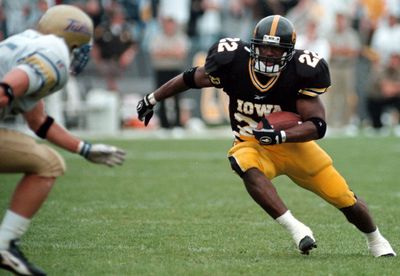
The Register-USA TODAY NETWORK
So Tavian Banks, this would have been 1992. He was a Class of ‘93 graduate, so I say this and it’s not like a regular high school running back deal. [Bettendorf] did not lose a game; they had— I think— one of the nation’s longest winning streaks in high school football, the two-and-a-half years he played varsity football. They won the state championship… He’s the number one recruit in the nation in high school football… coming out of Bettendorf, Iowa. So he came and visited my fourth-grade or fifth-grade classroom and I got to meet him in person.
He was so nice and positive, and he signed this football that I still have in my offices at home today that I’ve kept with me everywhere I gone, I always keep it in visibility. That made me fall in love with football and people, because I idolized this guy. So then he went to Iowa, had a great career, was the [1997] Big Ten Offensive Player of the Year and got drafted by the Jaguars and ironically ended up having a leg injury [which] ended his career. So for whatever reason, between where we’re from and I played running back, I wore the same number because of Tavian Banks and our careers kind of ended because of an injury like [that]… I don’t know, it for sure that changed me forever and I have had football in my life every day since that day.
What is the most miserable you’ve ever been as a coach on the field? And conversely, what is your happiest?
Anytime losing to Navy during my time in Army, there’s not even a close second.
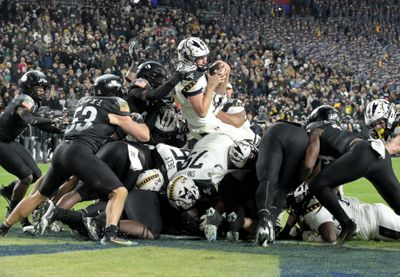
And it’s not like a rah-rah “I really want to beat Navy!” Dude, I saw every day with those players how hard those guys work and those coaches and how hard they invest.
To not have success in that game is to rob those people of an opportunity for success and happiness. You feel like you cheated those people, literally. It’s different than any other opportunity or game.
The happiest? Did you ask is it on the field specifically?
[The happiest moment] could be on the field, it could be at practice, you know, something like that.
Our safeties coach is Wes Fleming; the first time I ever met Wes Fleming was in 2011. I recruited him to St. Ambrose [an NAIA university in Iowa]. I met him at Marian Catholic High School cafeteria and sat down with them, trying to convince [him]… I explained him what St. Ambrose was trying to get him to come visit. He came to Ambrose, played all four years. I then got the head job at Kansas Wesleyan. I hired Wes there, he coached there and then went on to coach at Midland [an NAIA University in Nebraska] as the offensive coordinator then I got hired at Army, and we got him hired in Army and he went and got hired in Nebraska and then Cincinnati. Then when I got this job, we hired him here. This past summer, I was in his wedding.
When we got hired here [at Central], I got to watch him buy his first house. That’s probably the happiest I’ve been in coaching. To me, that’s what you’re trying to do when you get into this… A high school kid I recruited because of my job, you build a relationship with, and now it’s like we’re family. That’s probably the happiest.
Shoutout to our Safeties Coach @Fleming_Coach !!
– 10 years of coaching experience
– Helped lead Kansas Wesleyan to an undefeated season setting program records
– Chicago Native
This is a guy you want to play for!! pic.twitter.com/ZxvxbYTxPK
— Abigayl Cox (@abiiicox) May 18, 2025
What’s something you get way too competitive about outside of football?
Oh, right now it’s a little “Trivial Pursuit” but… Too competitive about? Man, you know, probably history.
I talk a lot about history, especially with my friends and if it’s something more mainstream like Red Dead Redemption 2, I take a lot of pride in that. I was a big Grand Theft Auto guy growing up on PlayStation 2 on, and have recently in the last like two years discovered Red Dead Redemption 2 on PlayStation 5, and I am obsessed with that game. I love everything about it so… I don’t know probably that you know just try to relax here a little bit as I get older, but try to eat a little better and calm down a little bit, not get quite so stressed, so hopefully less. It’s the answer that was before, but probably those two things.
What is the time in your life you thought was really challenging but you feel proud of the way that you responded to it? This could be on or off field.
Oh man. What a great question, I don’t even know where to start. I’m not a very patient person, by default. So anyone who knows me, if they’re listening, this is probably laughing unconditionally right now, because that’s the way I’m describing that.
But like, we’ll tell you this, man, like when you’re when you are coming up through lower levels of coaching, and you’re watching other people in the profession, it’s hard not to [be impatient.] I mean, it wasn’t as prevalent when I first got into it because technology was different. So, I’m really in that age bracket where I spent like the first half of college with no tech and the last half with it. I watched Facebook get invented, and people have an e-mail and people go from having no cell phones to everybody carrying them.
When I first got into coaching, it was much easier to enjoy the process. Once FootballScoop blew up and social media and stuff, it was challenging to have and remain patient where you try to enjoy the craft because you get caught up in the Joneses of like these people are moving up and this person’s younger than you and these guys are making X amount of dollars and this person’s won more games.
It’s not even that you pay attention to it. It’s that all your freaking friends do or their acquaintances, and they’re bringing it to your attention and asking you about it all the time. Sometimes you can sit there and you’re like, “geez, OK, dude, I get it. I’m not making $5,000,000 a year. That doesn’t mean I suck.” So you gotta fight some of that.
But I’ll tell you what: if you’re able to persevere and kind of fight that noise out and just stay on the tracks of what makes you happy, it makes you incredibly disciplined and incredibly patient. And man, do those two tools come in handy on and off the field in your personal life and professional life, and that process of my professional career took something that was an incredible weakness in my personality and I think evolved and changed that into a strength.
If there is one thing a person should know about Matt Drinkall, what would that be?
I love football, but I am never going to let it consume my life, meaning my time.
I will never win as many games as the other guys. I’ll never make as much money as the other guys. The legacy I would like to leave in coaching is balance. My staff is off for the next four days [as of recording]. I told them [to think] “if I go into the offices, one I should be in trouble.” I don’t want to see anybody in the building for the next four days. I want them to take time to go be with their families. I make everybody leave the offices at 5:30 [p.m.] every day. I’m structuring our system to come in a little later, leave a little earlier and have total balance so that when you’re actually at work, you’re working your ass off, not standing around talking and telling old war stories and everybody’s wasting time and you’re missing kids’ plays and games and dinners.
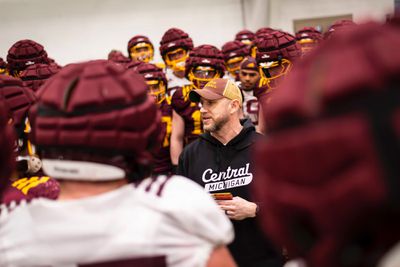
Central Michigan Athletics
You know, we had our first big staff get-together and the best thing that happened at the whole thing was one of my, one of my assistant coach’s daughters came up to me and was like “thanks for having him home every day.” So, that for sure. I’m a balanced guy. I believe that you can have too much of a good thing.
Maybe this all goes, burns, blows up in flames, and I get fired and we go winless and I look like an idiot. I’m telling you, we’re treating people the right way and we’re bringing good people into this program, and my coaches are around their families. If we lose games and I get fired, that might make me a loser. But whatever. I’ll have done it the way I know is the right way to do it.
Thanks to Greg Hotchkiss of Central Michigan Athletics for his help in setting up the interview and gathering media.
At the end of the interview, we gave Drinkall the opportunity to ask a question to the next interview subject. Our next interview in this series is with Bowling Green head coach Eddie George, who found his way into the MAC after a late vacancy left by the now-departed Scot Loeffler. You can find out his answer in the next edition.